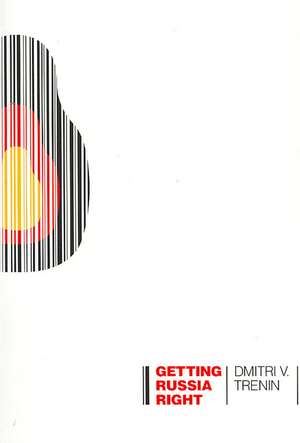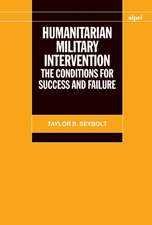Getting Russia Right
Autor Dmitri V. Treninen Limba Engleză Paperback – 5 sep 2007
In the early 1990s, Russia seemed on the brink of fully shedding its authoritarian and communist past. It made significant progress through engaging the world community as an emerging market democracy, a returning friend and neighbor to Europe and the West, and a strategic partner of the United States. The ensuing fifteen years of Russian history have witnessed several booms, such as the buoyancy provided by high oil revenues, and busts that resulted in retrenchment and centralization of power. What is the real Russia? Is the nation going in the wrong direction and becoming a threat-in-waiting, or is it moving along, and even forward, in a familiar three-steps-forward and two-steps-back pattern? In Getting Russia Right, Dmitri Trenin sheds new light on our understanding of contemporary Russia, providing Western audiences with an insider's explanation of how the country has arrived at its current position and how the United States and Europe can deal with it more productively. Trenin looks beyond Russia's famous leaders to the economic and cultural spaces outside the Kremlin where promising changes are taking place. Russia is probably not going to join the West, but it is on a path toward becoming Western; capitalist even if not democratic; European in terms of civilization, rather than as part of the EU; and gradually more Western than pro-U.S. Insightful and optimistic, Getting Russia Right offers policymakers, students, and stakeholders in the U.S.-Russia relationship an understanding of what Russia is—and is not. Russia will matter in the foreseeable future, and Trenin's innovative and objective analysis provides an understanding that is crucial to rebuilding relationships among the world's key players.
Preț: 103.72 lei
Nou
Puncte Express: 156
Preț estimativ în valută:
19.85€ • 20.77$ • 16.52£
19.85€ • 20.77$ • 16.52£
Carte disponibilă
Livrare economică 10-24 martie
Preluare comenzi: 021 569.72.76
Specificații
ISBN-13: 9780870032349
ISBN-10: 0870032348
Pagini: 129
Dimensiuni: 140 x 216 x 10 mm
Greutate: 0.2 kg
Editura: Brookings Institution Press
Colecția Carnegie Endowment for Int'l Peace
ISBN-10: 0870032348
Pagini: 129
Dimensiuni: 140 x 216 x 10 mm
Greutate: 0.2 kg
Editura: Brookings Institution Press
Colecția Carnegie Endowment for Int'l Peace
Notă biografică
Dmitri V. Trenin is deputy director of the Carnegie Moscow Center, a senior associate of the Carnegie Endowment, and chair of the Moscow Center's Foreign and Security Policy Program. He has been with the Center since its inception in 1993. He i
Descriere
In the early 1990s, Russia seemed on the brink of fully shedding its authoritarian and communist past. It made significant progress through engaging the world community as an emerging market democracy, a returning friend and neighbor to Europe and the West, and a strategic partner of the United States. The ensuing fifteen years of Russian history have witnessed several booms, such as the buoyancy provided by high oil revenues, and busts that resulted in retrenchment and centralization of power. What is the real Russia? Is the nation going in the wrong direction and becoming a threat-in-waiting, or is it moving along, and even forward, in a familiar three-steps-forward and two-steps-back pattern? In Getting Russia Right, Dmitri Trenin sheds new light on our understanding of contemporary Russia, providing Western audiences with an insider's explanation of how the country has arrived at its current position and how the United States and Europe can deal with it more productively. Trenin looks beyond Russia's famous leaders to the economic and cultural spaces outside the Kremlin where promising changes are taking place. Russia is probably not going to join the West, but it is on a path toward becoming Western; capitalist even if not democratic; European in terms of civilization, rather than as part of the EU; and gradually more Western than pro-U.S. Insightful and optimistic, Getting Russia Right offers policymakers, students, and stakeholders in the U.S.-Russia relationship an understanding of what Russia is—and is not. Russia will matter in the foreseeable future, and Trenin's innovative and objective analysis provides an understanding that is crucial to rebuilding relationships among the world's key players.













